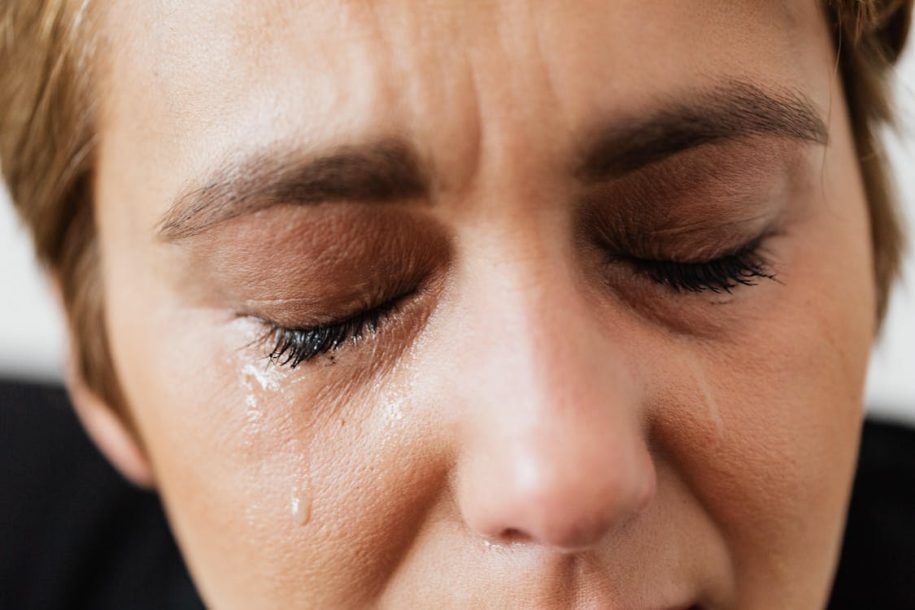Hair is fragile, and we lose a lot of it now and then due to various circumstances and external influences. The average number of strands of hair breaking each day is around 100 to 150. But to make up for it, hair can grow back out of their follicles. There are other conditions related to hair fall, the main one being genetics, which causes a condition called alopecia. Because of alopecia, hair stops growing in certain parts of the head, which leads to bald patches.
Image filename: person-with-hair-loss
Image alt text: A person with broken off hair in their hands.
Other conditions that can cause hair loss include hypothyroidism, which causes the hair to turn brittle or fall in excess, depending on the type of imbalance. Alcohol being a diuretic, can also cause a bit of hair fall due to its dehydration and lack of nutrients.
Emotional stress plays a significant part in hair loss. One of the more common causes of hair fall that people struggle with is a condition called telogen effluvium, which is typically caused by excessive emotional and physical stress. Suddenly, someone suffering from the condition will notice a thinning of hair with hair falling out from certain spots of the head. The hair goes through three phases:
- Anagen or growth phase.
- Catagen or transitional phase.
- Telogen or resting phase.
During telogen effluvium, the hair cannot move out of the telogen phase, and as hair progressively falls, there’s a lack of it on specific parts of the head. The hair does not enter the anagen phase to make up for the deficit either.
At a given time, it is believed that 5 to 10 percent of the hair on a person’s head may be in the telogen phase, where they might begin to fall. With more hair in the telogen phase and no hair moving toward the anagen phase, the hair fall increases.
Anxiety
Anxiety is a normal feeling to have, and it can take place when a person is nervous or scared. But if it lingers for too long or occurs too often, it can be a medical disorder. It can cause a lot of physical reactions and take a toll on your mental health. Feelings of jitteriness, fidgeting and uneasiness, followed by bursts of energy and spontaneity. Those suffering from a high amount of anxiety may also compulsively start sweating.
Image filename: a-stressed-out-businessman
Image alt text: A stressed out business man holding his head.
This generally activates telogen effluvium, which causes hair to fall. One of the bad habits that anxious people have is fiddling with and pulling their hair, which also adds to the already falling hair due to them being stuck in the telogen phase.
Depression
Depression manifests itself in the form of feeling sadness, and it differs from general moroseness due to a sudden lack of interest in things. Other symptoms include negative thoughts, such as worthlessness, suicide and death. The number of people suffering from depression, unbeknownst to them, is astounding.
Depression doesn’t just affect a person’s emotional state, but it also takes a toll on their physical health. Similar to anxiety, telogen effluvium is activated due to depression. Hair loss can be another emotional hit to a person, as hair loss affects a person’s image negatively.
The Effect of Poor Mental Health on The Body
Poor mental health can cause a person to treat themselves harshly and not take care of themselves, which is the opposite of what they require. Bad habits such as a poor diet are common during anxious and depressive phases. Because of the state of mind, the state of the body also deteriorates. When a person stops eating healthily, the body does not get the nutrients it requires to maintain or grow.
To make matters worse, people may also rely on recreational drugs and alcohol as a poor coping mechanism, which has detrimental actions on the body, limiting the stomach’s ability to extract nutrients and satiating hunger and other psychosocial effects that cause poor judgment.
What Causes These Feelings
Several external factors can happen to a person that can cause them anxiety and depression. A wide range of unfortunate events can trigger unpleasant memories or reactions, which can lead to anxiety and depression. In general, anxiety is very common, as people can become nervous about events that might take place, and their uncertainty can trigger the condition.
People suffering from pregnancy, PTSD and postpartum effects are commonly known to exhibit depression. A feeling of failure, unwantedness and longing to be relieved of misery take place.
How to Deal with The Problem
Telogen Effluvium, similar to anxiety and depression, is curable. The effects of it can be minimized, and the hair eventually grows back after falling out. These issues can be dealt with by acquiring therapy for mental conditions, adopting healthy coping mechanisms. For the hair fall, a proper diet has to be put in place. Eating eggs, berries, fatty fish and staying properly hydrated can induce a positive change and cause hair to grow back from the follicles.
Dealing with The Hair Loss Due to Emotional Stress
There’s a chance that hair may not grow back due to follicle miniaturization, which renders hair unable to sprout from the follicle. In this case, external treatments are required to add hair to the scalp. One of the best solutions is hair micropigmentation, which involves adding pigments to the scalp. While it does not grow hair back, the treatment is entirely safe due.
The pigments are made up of natural, organic items that are perfectly fine for human skin use. The procedure is becoming increasingly popular due to its high rate of success. It can improve a person’s aesthetic appearance at a fraction of a cost compared to other solutions available on the market.
Delaware Scalp Micropigmentation provides hair micropigmentation for men and women to give them back their lost confidence and self-esteem by providing them with a new look. Reach out to us for an appointm

